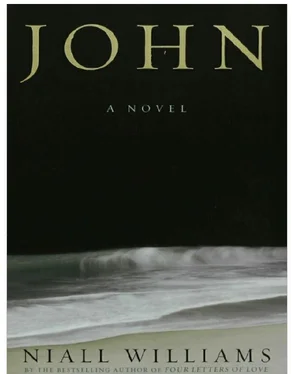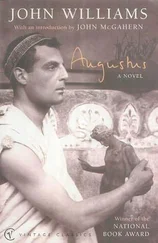The disciple scratches wildly, prays contrition, screws tight his eyes.
The storm rages.
Something is happening.
Indeed, the heavens are wild, Matthias thinks. He sits forwards, elbows on knees, fingertips a tent below his lips. Perhaps Prochorus hammers on heaven's gate. Perhaps the Divine makes clear his displeasure with him, blows him thither to a furnace beneath.
It is a thought.
Papias breathes still, but thinly. The candlelight is canted, the small room umber and dark, shadows long and twisted. To the howling there is no end.
I have my twelve. But no miracle. This one, the servant of the old man, is most apt. What better disciple. I save him and he follows me. It follows as numbers, one upon the next.
But live, youth. Live.
Outside wind and rain contend. The dark is beaten with fury. The skies crash and bang and no dawn approaches.
But beneath all, prone on the bed mat, from the lips of death Papias returns. His chest expands more profoundly. Matthias draws the candle closer to examine if indeed the colour comes in his cheek. When he is convinced, he blows out the candle and shuts the narrow room into darkness complete. Then he goes dimly to the door and cries out into the storm.
'O heaven! O Divine!'
He has to shout again before Auster comes from beneath a covering, stands in the gale.
'What? What, Master?' he shouts.
'It is Papias. He is dead. Look.' Matthias draws open the door into the dark. Auster sees what he has been told is there, the motionless body of the dead, and is turned back by the hand of the other. 'Go, go and tell the others,' Matthias says into the wind. 'Go and tell the old man.'
Auster nods, blinks, shouts against the storm: 'But the fire did not burn him.'
'Go! He is dead. Tell them to come at sunrise. Go now! Hasten.'
Fool. Belief is easily created in a fool.
Matthias waits a moment, admits surprise himself at the push of the wind against the chest; a man cannot stand upright in the world tonight. His dark head he tilts upwards to the starless vault, flesh of his cheeks pressed flat to the bone, eyes watering with salt. He turns to re-enter the shelter but catches sight of a blanched lump not far off. What is it? He cranes toward it, this whiteness, then goes seven steps in the dark to see lying there what seems a fallen swan. He sees the one, and then another, then all about the dwelling, in a vast littering he can make out the bodies of white seabirds slain. There are a hundred, maybe two. He cannot count. The image of them, a mass of white feathering pitched out of the sky and slung there about his dwelling, makes Matthias gasp. There is a sky army fallen. He holds an arm above his head, as if a rain of birds may descend still. He looks up into the deep dark, the swarth of night, sees the nothing there is. He foots a seabird next to him to be certain it is dead, toe-feels the cold, wet plumage; with heavy looseness the neck slides further into the stones. For moments Matthias cannot move, the appalling sight of so many arrests him. It is as though the world is turned upside down and the earth-sky studded with birds. They are legion, and may continue beyond the dark edge of vision. Matthias holds a hand to his mouth. The night blows at him. He thinks of plague and contagion, all manner of canker and pestilence that may be broadcast in such upheaval.
He regains himself, turns to hurry back to his dwelling, but cannot keep from another gaze. He looks back at the swan sea, considers, nods.
A portent. Useful. Mythological. The Night of Resurrection it happened that.
Stepping inside, Matthias relights the candle, stoops to see Papias is breathing well.
They will come at daybreak for prayers. There is an hour, maybe less, beforehand. He readies himself. In the earth of the floor next to the bed mat he scrabbles two depressions, rubs at his knees with a small stone till they redden raw, then kneels into the holes. In fools appearance is the foundation for faith. A soul cannot easily be resurrected. There must be effort, and of this there must be evidence. He considers his posture when they come to the door. He will bend down so, he will have prayed himself into the very ground so — nay, look at the imprints. He will have his two hands lain upon the youth's forehead and be praying and not even look up or notice they are arrived.
But I will need another sign. Something of the cost of intercession. That it is not the business of mortals, but only those who can touch the Divine.
A wound. I should have a wound.
From where he kneels, Matthias looks into the shadowed room. Upon the table is a short metal spike, holed one end as a needle. It is within his reach. How the Divine provides for his own.
Matthias waits. He listens into the whirl of the wind for the bell ring and for those who will be coming. He is perfectly poised. Papias breathes easily now and soon will wake. He may hear or not, it is of no import. The others will let him know Matthias wrestled him back from death.
Then, faintly, like a distant bird lost, the bell sounds. There is no light. No daybreak is apparent to Matthias, but must be. He takes the metal spike, touches its tip to the candle flame, then he brings it to the corner of his eye.
I will weep blood.
With one hand holding the spike to the outer corner of his eye and the other raised behind it, he begins to press. The needle burns minutely. With a sudden blow, he smacks hard the hand that holds it, and it pops with blood spurt in past the corner of his eye socket. He shrieks out, pulls and lets fall the spike, then must fumble in the dirt to find it quickly and throw it out of view. The pain is wild. Blood blurs his seeing, but he finds the needle and flings it away. Roughly he pokes at the wound, the pulpy blood and watery leakage of himself, draws a weep line on to his cheek. His teeth chatter and he has to bite hard to keep from weakness. Their footsteps approach. He throws himself forward, lays both hands on the youth's forehead, and says aloud the prayers in a voice not his own.
Then John and the disciples step inside. They see the shocking figure of the kneeling mourner, the blood flowing freely from his eye. Then Linus sees the chest of Papias rise.
'He lives!' he cries out. 'Papias lives! Look. Behold, he is brought back!'
The younger disciples fall to their knees. The Apostle stands.
'Papias lives?' he asks.
'He does,' Auster says. 'Praise the Divine.'
There is the murmuring of prayer. The door being ajar and the gathering both inside and out, the storm blows amongst them. The framing of the hut creaks, the cloth tenting slaps and snaps angrily. A beaker rolls on the floor.
'Bring me to him,' John says.
Ioseph leads him. Auster and Linus offer their arms to lift Matthias from his kneeling, his bloodied eye-weep making the others look away.
'God has answered my prayers,' Matthias says aloud. 'Praise him.'
'Look how he has prayed himself into the ground,' Linus whispers, pointing to the imprints.
John reaches his hand, pats the dark until his outstretched fingers descend to find the face of the youth. He kneels then. His fingers lie flat against the cheek of Papias and he bows his head. He says nothing. He touches the ravaged ear and a shudder passes through him. His blind eyes he shuts tightly.
O Lord. O Lord Jesus.
I am a poor shepherd who loses his sheep.
Forgive me.

His lips do not move; his prayers are unheard. Some leave to accompany Matthias and to dress his wound. Others kneel on their uncertainty. John stays, and in his staying suffers the pain of self-knowledge. He sees his weakness, his withdrawal, his waiting. He sees how ineffectual he has become, how the community itself falls away to nothing. How day by day time erodes what had been built with blood and suffering. It is his fault, vanity that made him believe his work was over and the Lord Jesus would respond by coming now. He has been blind in all ways, not merely in sight. But above all, he has forgotten the essence that returns so powerfully to him now. He has forgotten love.
Читать дальше











